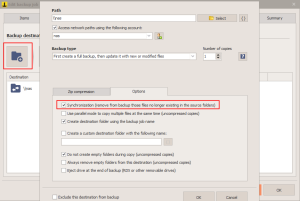https://www.iperiusbackup.com/cms/iperius-backup-tutorials.aspx
Iperius is a very flexible backup software and comes with many advanced features to optimize backup efficiency. One of these features is the Synchronization, therefore the chance to delete from the backup those files no more existing in the source items. In this way you can save disk space and keep perfect mirror copies of your important folders.
Synchronization is available in two different backup types: backup to local mass storage devices (external USB drives, RDX, NAS, etc.), also using zip compression, and FTP backup (upload). Enabling it is very simple, since you just need to check the dedicated option in the destination, as shown in the picture below:
Iperius allows to synchronize folders and files in a very simple way. You can configure unlimited backup jobs to make multiple synchronizations at the same time (parallel execution).
Please remember that synchronization should be used carefully, since it is an operation that permanently delete files from backup folders. You must be sure of what you are doing, and it is generally recommended to keep at least another backup copy where synchronization is not used.
Synchronization can be used not only for copying files to NAS or local disks, and for copying to FTP and SFTP. In fact, Iperius is a complete cloud backup software, which allows you to upload and synchronize files even on Google Drive, Dropbox, Azure Storage, Google Cloud Storage, OneDrive, One Drive for Business accounts, Amazon S3 and any other S3 compatible storage (Minio, FreeNAS, Aruba Cloud, Wasabi, etc.).
Synchronization with offsite storage space like Google Drive or Amazon S3 allows you to have one or more folders synchronized between different users, or still have a mirror copy of local files up to date.
It should be remembered that synchronization is an option to be used with caution, because it is an operation that permanently deletes files from backup folders. We must therefore be sure of what we do, and that the backup copy must actually be synchronized. In fact, if by chance we should mistakenly delete a local folder, it would also be deleted from the destination of the synchronization, thus causing a loss of data. Therefore, it is always advisable to combine synchronization with an additional backup operation, which keeps multiple copies of data in a different destination. You must be sure of what you are doing, and it is generally recommended to keep at least another backup copy where synchronization is not used.
Synchronization and backup are therefore both very important aspects in data backups, and must be used specifically according to needs and security. For more information on Iperius backup types or for NAS and Cloud backup, see the following tutorials:
https://www.iperiusbackup.net/en/backup-nas-make-iperius/
https://www.iperiusbackup.net/en/make-incremental-ftp-backup-upload-iperius/


Restoring Files or how to Synchronize properly?
As it looks like the synchronisation option only applies to FULL backups. So if I create a chain of 14 daily incremental (or differential) backups it will take me 14 days before obsolete files will be removed from the full backup. If I now would like to restore files to get the state of the backuped files from seven days ago, I am kind of lost… because all files deleted in this seven days timeframe were not delete from the full backup.
Am I getting something wrong or ist that simply the way it is.
Thank you and regards
Wolfgang
Hi,
you simply have to copy back the full backup content, and then the incremental backups, starting from the oldest one.
I would like to keep both a local copy of the backups on a NAS in the building and then move the changes to the cloud.
What is best method to do this.
What is best method to rotate out the outdated cloud backup files.
Thanks
Hi,
you can configure two different backup job. The first one to the nas and the second one to the cloud, with different scheduling.
I am using the free version of Iperius Backup. I have it set to do a Full backup followed by 6 differentials. Synchronization is not checked plus I read that it was disabled in the free version. However, the latest differential backup showed 13 objects deleted followed by “Files deleted by synchronization:” and a list of those files (all .dat files).
Can you explain why?
Thanks.
Hi, files are deleted (in a similar way it occurs when you check the synchronization option) because when Iperius creates a differential or incremental backup, and the folder already exists, it clear it, since previous incremental or differential backups must be replaced by new ones entirely, to make them related to the previous/full backup.
Is there any option to delete old backup files automatically?
Hi,
there isn’t an option to delete the old backup in Iperius Backup but with the Synchronization option, you can overwrite the old backup in place of deleting them.
For any other question, please write to support@iperius.net
Hi,
i need to backup , a folder , the files inside this folders are temprarly residant , which mean my system remove those files within few seconds, i want to copy them before system delete them, the point how to make online hot backup (differential), the timer interval in Minutes!! i need to run the task every 2 seconds (online/monitoring),
also how to ensure if i have duplication to keep all copies
regards
Hi,
You can choose in the Destination panel inside the Job the backup type “Keep a full backup and a number of differential copies” selecting the Number of copies, have a look at this tutorial: https://www.iperiusbackup.net/en/backup-types-with-iperius-full-incremental-differential/.
More you can configure in the Scheduling panel the Execution time “Each” 2 minutes or the delay time you need.
For further technical question open a ticket on https://support.iperius.net
I’d like to use the Synchronization option to match the deletion from the source, however before the file is deleted from the backup I’d like it copied to a “deleted” backup directory, with similar storage path as it’s original location. My thought is, if the source has files which were deleted, then they are deleted from the backup, I can always turn to my deleted folder, and find anything that no longer exists. This would get my source closer to what is on the server with the added protection of never losing my deleted file.
Is this currently possible to configure?
Hi,
Unfortunately it’s not possible to copy the deleted files to a specific directory.
For any technical support, please open a ticket on https://support.iperius.net
Hello,
About this option, I am using the free version and that option is grayed out. So what happens is eventually the entire backup drive gets filled up. Are there any options in the free version to prevent this or is the answer to upgrade to a paid version? Any help on this is greatly appreciated, thanks.
Hi,
In the Free version is not possible to synchronize the data. However you can activate the 21-day trial period, during that you can explore all the features of the Iperius Full product (https://www.iperiusbackup.com/backup-software-windows.aspx) . At the end of the 21 days you can decide to buy Iperius, stay with the Freeware version or uninstall it.
For more technical support please open a ticket on https://support.iperius.net
Hello,
I was testing the free version and was hoping I can click somewhere to make the files keep their original dates. It looks like when they get backed up they all change to today’s date. I have police evidence that I need to keep the same timestamp from when it was originally created. Is this possible?
Thanks,
Hi,
Usually the folders have timestamp of the backup execution but the content so the data have the original timestamp.
For more technical support open a ticket on https://support.iperius.net
So, in the free version you can’t “synchronize” backup data?
So, this is why I was left with like TBs of useless data in my destination data…
This seems more like a bug in free version rather a missing feature.
Time for a better backup app.
thanks
Hi,
no it’s a feature not included in the Free version: https://www.iperiusbackup.com/backup-software-windows.aspx
For more technical support open a ticket on https://support.iperius.net